REVIEW: Inception
Jul0
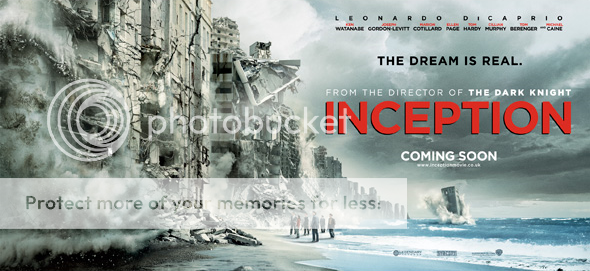
Inception poster ©2010 Warner Brothers, all rights reserved.
“What is the most contagious parasite?” asks Leonardo DiCaprio’s character Mr. Cobb in the early moments of Inception. “An idea.” From the tiniest seed, it spreads like a virus, he explains. This is what makes it vulnerable to manipulation and theft. In many ways, the same could be said for Inception itself. Bending time, delving layers of dreams within dreams, shifting between reality and fantasy, the movie is instantly contagious. By the final shocking scene, when four concomitant worlds finally weave together in a breathlessly taut salvo, one is left downright feverish. It also happens to be one of the smartest, best-written, enigmatic additions to the typically content-light action genre. ScriptPhD.com’s full review of Christopher Nolan’s chef d’œvre under the “continue reading” cut.
It’s Not Easy Being Green: Powering The Future (Podcast)
Jul0

Wind turbines collecting energy that will eventually be converted into electricity and other fuel sources. This technology is widely discussed in the new Discovery Channel special "Powering The Future." Image courtesy of Discovery Channel.
Nothing has done more to reinvigorate discussions about energy and fuel dependence than the tragic oil spill currently afflicting the Gulf Coast [excellent resource for trajectory, timeline and news sources]. Though scientists and oil manufacturers continue to debate the validity of the “Peak Oil” theory, a very uncomfortable reality looms that oil production may not be able to keep up with thirsty demand. With an ever-increasing global population, a constant proliferation of technology choices and lifestyle improvements, and a rising middle class in third world countries, the factors contributing to fuel consumption may be the precipice of an eventual geopolitical crisis. In an effort to showcase their dedication to addressing the most salient energy and environmental questions affecting our generation, the Discovery Channel, backed by founder John Hendricks, is launching a revolutionary four-part documentary called Powering The Future. In it, they address a range of economics, national security, social and scientific questions related to energy and fuel all through the single focal point of searching for a modern, clean, limitless supply of energy. Our coverage of Powering the Future includes a review of the first installment and an exclusive podcast interview with the show’s host, lead scientist for the Nature Conservancy, Dr. M. Sanjayan. For full content, please click “continue reading.”
‘From Eternity to Here’ with Physicist Sean Carroll
May0
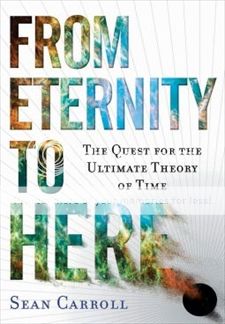
Physicist Sean Carroll's new book "From Eternity to Here." ©2010 Dutton Books, all rights reserved.
What is time? How does it work? Why is it immutably unidirectional (moving from the past and towards the future)? And most importantly, why does time exist at all? These are among the preeminent metaphysical questions to date for scientists and laypeople alike. Using the principles of entropy and universe expansion since the Big Bang, cosmologist Sean Carroll (recently profiled in the New York Times) hypothesizes about the arrow of time in a brilliant new book From Eternity to Here: The Quest for the Ultimate Theory of Time. In addition to reviewing the book, ScriptPhD.com’s in-house physics and astronomy guru, Stephen Compson, had an extraordinary opportunity to sit down with Dr. Carroll in his physics lab at Caltech University. In a stunningly in-depth, rich interview, they explored everything from the creation of our universe, to entropy, the time-space continuum, how physics and film intersect, and why the principles in Dr. Carroll’s book are important and topical for the general public to grasp. It’s rare to see this wide-ranging of a discussion on popular physics from such an authoritative researcher, so sit back, enjoy and click “continue reading” for more.
ScriptPhD Roundtable: Naturally Obsessed—The Making of a Scientist
Apr0
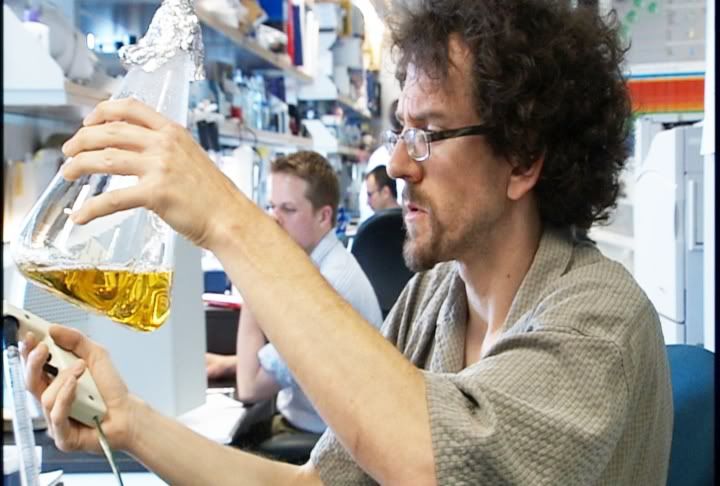
Graduate student Rob Townley mixes solution in a beaker in a scene from documentary "Naturally Obsessed: The Making of a Scientist." Film images ©ParnassusWorks Films, all rights reserved.
Society’s unequivocal fascination with science and scientists, reflected by a growing presence as staples of film, television, and popular culture, has only been magnified by the enigmatic (and seemingly impenetrable) aura in which they are enveloped. Their studies decidedly abstruse, their coded language unintelligible, their habits quirky and eccentric, the world of the scientist has been an audiovisual shroud of mystery—until now. In perhaps the most authentic, unfiltered, extemporaneous portrayal of scientists in their environment ever recorded, new documentary Naturally Obsessed: The Making of a Scientist welcomes the lay audience into the laboratory as silent observers. No reservations, no restrictions, no preconceptions. The result is an emotionally stunning masterpiece that connects us to scientists as people, reaches out across professional divides, and places PhD students, the backbone of the modern scientific laboratory, under the microscope for the first time. ScriptPhD.com recently screened the movie with a group of UCLA PhD biology students. Under the “continue reading” cut is our review, along with an honest roundtable discussion that included reaction to the movie, its parallel to their lives, and the training of modern scientists.
REVIEW: Hubble IMAX—Editor’s Selection
Mar3

Hubble 3D IMAX poster ©2010 Warner Brothers Pictures, all rights reserved.
The Hubble Space Telescope is the world’s first observatory that actually orbits—you guessed it—through outer space. Over the last decade, Hubble has captured some of the deepest and most detailed images of our universe. All those recent headlines about exoplanets: those discoveries come from Hubble. Scientists viewing pictures of light projected from stars over 13 billion years ago (almost at the origin of the universe): that’s Hubble, too. Hubble 3D documents the 2009 mission by the crew of the Shuttle Atlantis to make vital repairs to one of mankind’s most expensive, and significant, science projects. There would be no second chances. If the mission had failed, Hubble would be just another piece of junk orbiting above the earth, like my Direct TV satellite and Elvis’s body. The tension is real, the suspense extraordinary, and the imagery? Out of this world. And fortunately for terrestrial audiences, the entire mission was captured by the crew and director Toni Myers on some of the most breathtaking, brave film ever recorded. We are proud to make Hubble 3D an official ScriptPhD.com Editor’s Selection.
REVIEW: The Crazies
Feb1

The Crazies poster and images ©2010 Overture Films. All rights reserved.
Esteemed drive-in movie critic Joe Bob Briggs has a single three-word critique of a certain kind of genre picture: “too much plot.” That’s a little easy and dismissive, but it does speak to an underlying truth: the best horror and suspense movies have to be easy to follow, or you’re in trouble. This particular genre is all about being In The Moment, especially if The Moment is designed to scare the heck out of the audience. Forcing them to pause and say, “Hey, wait a minute: why’s he doing that? Who’s that guy again? Why is he doing that?” rips the viewer out of that Moment. A better formula is to keep it simple. Or even better: keep it relentless. Out in theaters today is the well-made, competent, if flawed, bio-horror thriller The Crazies. Ironically enough, while The Crazies has some not-so-crazy plot and technical problems, the biology and science of this movie (with some minor exceptions) are the most enjoyable part. ScriptPhD.com full review and discussion under the “continue reading” cut.
It’s Not Easy Being Green: Mountaintop Removal
Feb0
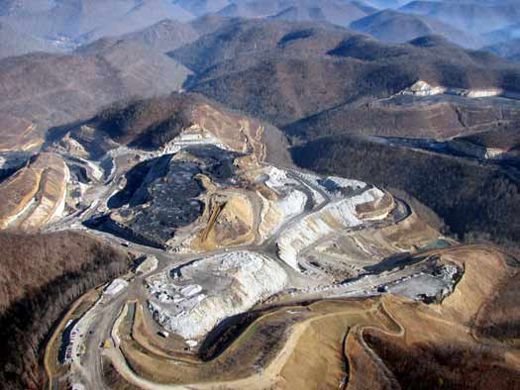
An Appalachian mountain that has been decimated by coal mining.
One of the most pressing issues of our time is how and where we are going to get sustainable energy for a global population with a rapidly rising standard of living and the consumption that this entails. Approximately 10% of United States coal production [coal in general accounts for 40% of global electricity production] is procured through mountaintop removal, an environmentally-devastating extraction that literally involves blasting off (or removing) the top of a mountain to extract the coal inside. The practice gained popularity in the 1960s, when it started becoming too difficult and too costly to extract coal from underground mines. In our continuing “It’s Not Easy Being Green” series, ScriptPhD.com’s eco-blogger Captain Planet talks about the documentary Mountaintop Removal, exactly what it entails, and why this process is so much more costly than the immediate energy gained from it. Please click “continue reading” for more.
Guest Article: HBO’s ‘Temple Grandin’ Biopic Honors Autistic Scientist
Feb2
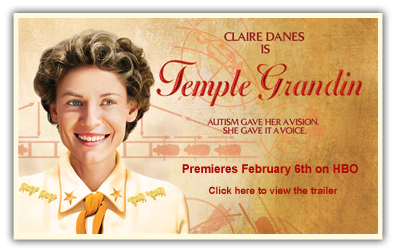
Temple Grandin film poster ©2010 Home Box Office, all rights reserved
This was a remarkable week for autism science and publicity. In a stunning and rare reversal, medical journal The Lancet retracted the 1998 paper responsible for suggesting a link between autism and MMR vaccinations, incurring over a decade of acrimonious debate and frightened parents. Ironic then that this should be the week when HBO premieres their new feature film Temple Grandin, about the eponymous world-famous scientist. Dr. Grandin has written and spoken openly about her struggle with autism and how it’s colored her view of the world and influenced the science she studies. ScriptPhD.com is extraordinarily honored to extend a warm welcome to friend and fellow blogger Susan Etlinger, author of the autism spectrum blog The Family Room, to review the biopic and interview the project’s executive producer. For full content, please click “continue reading.”
Forever Young: Living in an Age of Agelessness
Jan1

The chemical compound resveratrol, a component of red wine that has been linked to anti-aging properties in laboratory experiments.
During a recent trip to New York City, I had the pleasure of befriending exciting new author Ernesto Robles, whose debut novel The Malthusian Catastrophe is a ScriptPhD.com recommended pick. Smart, topical, fast-paced and decidedly engrossing, this biomedical thriller drives at the roots of our cultural obsession with the “fountain of youth” and the perilous socioeconomic repercussions of actually finding and disseminating it. In a year when the Nobel Prize for Medicine and Physiology went to a team of researchers for their discovery of how chromosomes are protected by telomeres and the enzyme telomerase, essential biological components of the human aging machinery, and a cultural era that has anointed juvenescence as sacrosanct, Malthusian’s overarching themes are especially germane. ScriptPhD.com’s discussion includes a review of the book, the biology and ethics of current aging research, and a one-on-one interview with Mr. Robles. For full content, please click “continue reading.”
On ‘Creation’, Charles Darwin, and Survival of the Fittest
Jan0
There is grandeur in this view of life, with its several powers, having been originally breathed into a few forms or into one; and that, whilst this planet has gone cycling on according to the fixed law of gravity, from so simple a beginning endless forms most beautiful and most wonderful have been, and are being, evolved.

Charles Darwin
Charles Darwin’s postscript to perhaps the greatest work of biology ever recorded, The Origin of Species, ignited an acrimonious debate about science, religion, the mutual exclusivity thereof, and where we come from. 150 years later, as we celebrate the anniversary of Darwin’s monumental scientific achievement, it is a debate that has yet to abate. Regardless of what stance one takes on evolution and natural selection, fascination with the life and times of this inimitable figure is undeniable. A new biopic, Creation, delves into the dichotomy of Darwin the naturalist and family man, the disapproval he faced from a devotedly Christian wife, and the inner anguish he faced in whether to publish his findings. ScriptPhD.com’s Stephen Compson was recently treated to a private screening of the film and had the extraordinary opportunity to sit down with Darwin’s great-great-grandson Randal Keynes, whose Charles Darwin biography the movie was based on. For our exclusive content, please click “continue reading.”

















